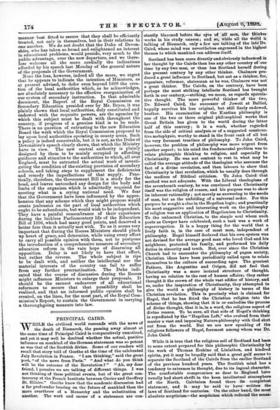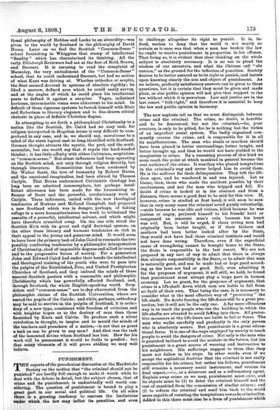PRINCIPAL CAIRD.
WHILE the civilised world resounds with the news of the death of Bismarck, the passing away almost at the same time of Principal Caird is comparatively unnoticed, and yet it may well be doubted whether the actual, positive influence on mankind of the German statesman was so potent as was that of the Scottish divine. Some of our readers will recall that story told of Goethe at the time of the celebrated July Revolution in France. "I am thinking," said the great poet, "of the news from Paris." "And what do you think will be the outcome of the Revolution " " Ah, my dear friend, I perceive we are talking of different things. I was not thinking of these political events, but of the great con- troversy at the French Institute between Otivier and Geoffrey St. Hilaire." Goethe knew that the academic discussion had a far profounder bearing on the future of mankind than the mere overthrow of a Monarchy and the substitution of another. The work and career of a statesman are con- stantly blazoned before the eyes of all men, the $11inkes works in his study unseen; and so, while all the *cad is talking of Bismarck, only a few are talking of the late Dr. Caird, whose mind was nevertheless engrossed in the highest themes to which mankind can address itself.
Scotland has been more directly and obviously influenced in her thought by the Cairds than has any other country of our time by any two men, or than has Scotland herself during the present century by any other thinker. Chalmers pro- duced a great influence in Scotland, but not as a thinker, for, organiser, reformer, statesman as he was, Chalmers was not a great thinker. The Cairds, on the contrary, have been perhaps the most striking intellects Scotland has brought forth in our century,—striking, we mean, as regards specula- tive thought. The more powerful thinker of the two, Dr. Edward Caird, the successor of Jowett at Balliol, happily survives his less original, but still finely endowed, brother. His examination of the Kantian philosophy is one of the two or three original philosophical works that Great Britain has given to the world during the latter half of this century ; it is a work, whether regarded from the side of critical analysis or of a suggested construc- tive metaphysic, worthy to stand in the front rank of all but the very foremost treatises of philosophy. To John Caird, however, the problem of philosophy was more urgent from another aspect; to his mind the fundamental problem was to relate philosophic thinking to religion, and especially to Christianity. He was not content to rest in what may be called the average attitude of the theologian who assumes the fact of a divine revelation, and then labours to show that Christianity is that revelation, which he usually does through the medium of Biblical criticism. To John Caird that method was not adequate. With the Liberal theologians of the seventeenth century, he was convinced that Christianity itself was the religion of reason, and his purpose was to show its inherent rationality ; not merely as answering to the needs of man, but as the unfolding of a universal order. For this purpose be sought a clue in the Hegelian logic; and practically his most suggestive and interesting work on the philosophy of religion was an application of Hegelianism to Christianity. To the unlearned Christian, to the simple soul whom such poets as Cowper have celebrated, such a task was a work of supererogation. It is a happy thing for the world that a lively faith is, in the case of most men, independent of philosophy. Hegel himself declared that his own system was not devised for the average good man who loved God and his neighbour, protected his family, and performed his daily duties in sincerity and truth. But, ever since the Christian Church had to encounter the philosophy of pagan society, Christian ideas have been periodically called upon to relate themselves to the culture of succeeding ages. The greatest Fathers, like Augustine and Origen, did not feel that Christianity was a mere isolated structure of thought, having no relation to the rest of human affairs; they rather thought it the crown of the whole vast edifice of history, and so, under the inspiration of Christianity, they attempted to give the world a philosophy of history in terms of the Christian revelation. This is precisely what is claimed for Hegel, that he has fitted the Christian religion into the scheme of things, showing that it is or embodies the process of divine thought, that it is, in a word, the religious aspect of divine reason. To be sure, all that side of Hegel's thinking is repudiated by the "Hegelian Left," who evolved from their master a vast and imposing Nature-philosophy with God shut out from the world. But we are now speaking of the religious followers of Hegel, foremost among whom was Dr. John Caird.
While it is true that the religious soil of Scotland had been to some extent prepared for this philosophic Christianity by the work of Thomas Erskine of Linlathen, and kindred spirits, yet it may be broiadly said that a great gulf seems to separate the Scotland of the Cairds from the earlier Scotland of the previous hundred years. The Scottish mind has a tendency to extremes in thought, due to its logical character. The comfortable compromises so dear to England have usually had short shrift in the keen intellectual atmosphere of the North. Calvinism found there its completest statement, and it may be said to have written the laws of Scotland for centuries. On the other hand, the most absolute scepticism—the scepticism which reduced the sensa. tional philosophy of Hobbes and Locke to an absurdity—was given to the world by Scotland in the philosophy of David Hume. Later on we find the Scottish " Common-Sense " school furnishing to Whiggism that stamp of intellectual "finality" which has characterised its thinking. All the early Edinburgh Reviewers had sat at the feet of Reid, Brown, and Stewart. It is amusing to read the complaint of Macaulay, the very embodiment of the " Common-Sense " school, that he could understand Stewart, but had no notion of what Kant was driving at. Whether orthodox or sceptic, the Scot seemed devoted to systems of absolute rigidity; he liked a narrow, defined area which he could easily survey, and at the angles of which he could place his intellectual posts to defend it against a surprise. Vague, indistinct horizons, interminable vistas were abhorrent to his mind. In default of these rigorous systems he betook himself with Blair and Robertson to literary elegance and to fine-drawn ethical rhetoric in place of definite Christian dogma.
In attempting to set forth a philosophical Christianity to a nation like the Scottish, Dr. Caird had no easy task, for religion interpreted in Hegelian terms is very difficult to com- prehend in any case, and is, we should say, unwelcome to a mind of the stern logical east so long identified with Scotland. German thought attracts the mystic, the poet, and the senti- mentalist, but one would say that it repels the hard-headed thinker ; it has little affinity with either Calvinism, scepticism, or "common-sense." But silent influences had been operating on the Scottish mind, not only through religion directly, but through literature. Romanticism had been awakened by Sir Walter Scott, the love of humanity by Robert Burns, and the emotional imagination had been stirred by Thomas Carlyle. That Burns undermined Calvinistic theology has long been an admitted commonplace,_ but perhaps insuf- ficient allowance has been made for the humanising in- fluence of Scott and the powerful, revolutionary work of Carlyle. These influences, united with the new theological tendencies of Erskine and McLeod Campbell, had prepared a new Scotland which was in danger, perhaps, of taking refuge in a mere humanitarianism too weak to withstand the assaults of a powerful, intellectual solvent, and which might have therefore crumbled away. On the one side stood the Scottish Kirk with its great and rigid doctrinal system, on the other these literary and humane tendencies so rich in their appeal to the young and generous mind. It would seem to have been the primary task of John Caird to reconcile the two possibly conflicting tendencies by a philosophic interpretation of Christianity, shed of impossible dogmas and allied to reason and to the progressive forces of society. For a generation John and Edward Caird had under their hands the intellectual and theological training of the youth who were to pass into the pulpits of the Established, Free, and United Presbyterian Churches of Scotland, and they imbued the minds of these nascent Scottish pastors with a reasonable and philosophic Christianity which has powerfully affected Scotland, and, through Scotland, the whole English-speaking world. Scep- ticism and "common-sense" are to-day eliminated from the philosophic claims of the Scottish Universities, where are seated the pupils of the Cairds ; and while, perhaps, orthodoxy may be said to survive in the pulpits of Scotland, it is ortho- doxy of a new type, consistent with freedom of criticism and with brighter hopes as to the destiny of man than those furnished by Knox and Calvin. To produce such a silent revolution in thought, to inspire and to mould the minds of the teachers and preachers of a nation,—is not that as great a task as can be given to any men? And that was the task of the lamented divine whom Scotland has lost. How far his work will be permanent it would be futile to predict ; but that many elements of it will prove abiding we may well believe.



































 Previous page
Previous page